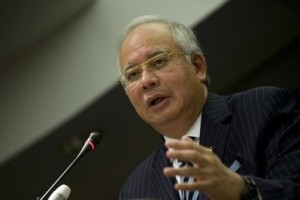
Malaysia’s state oil company has suspended gasoline supplies to Iran, Prime Minister Najib Razak said here Thursday, calling on Tehran to review its controversial nuclear program.
The announcement of the suspension by Petronas came after Najib held talks with US President Barack Obama, who called for the world to move “boldly and quickly” on new Iran sanctions on the sidelines of a 47-nation nuclear security summit this week.
“It is a decision made by Petronas. They did consult with the government but they took the decision to suspend the sales,” predominantly-Muslim Malaysia’s leader Najib told reporters in Washington as he wound up a four-day visit.
He did not say when Petronas stopped supplying gasoline to Iran but some reports said it was done in the middle of March.
Petronas is among a small group of non-Chinese oil companies supplying gasoline to the Islamic republic, which is the world’s fifth-largest crude oil exporter.
“We really want Iran to comply with the UN decision of the Security Council and we maintain our position that Iran has the right to develop nuclear energy for peaceful purposes,” Najib said.
“But they must earn the trust of the international community and the only way they can earn the trust is to be fully transparent in whatever they do and allow full verification by the IAEA and there are some serious doubt as to whether this has been carried out or has been complied with by Iran,” he said.
Iran has been accused by the United States and its allies of covertly working on a nuclear weapon but the Islamic republic says it is pursuing only civilian power.
A member of the OPEC cartel, Iran has been languishing in a dearth of investment in petroleum refineries as a result of US sanctions. It has resorted to importing about 40 percent of its gasoline needs.
Najib agreed in talks with Obama that the global community should send a “clear signal” to Iran over its nuclear program, the White House had said.
The Malaysian decision was announced as envoys of six world powers held another closed-door meeting in New York Thursday on a fourth round of UN sanctions against Iran.
Ambassadors from the five veto-wielding members of the UN Security Council — Britain, China, France, Russia and the United States — plus Germany — met for a second straight day after huddling for more than three hours Wednesday in what they described as “constructive” substantive talks on the issue.
On the table was a US draft resolution outlining sanctions in five areas: arms embargo, energy, shipping, finance and targeted punitive measures against Iran’s powerful Revolutionary Guards, a diplomat familiar with the discussions said.
Last October, the International Atomic Energy Agency (IAEA), the global nuclear watchdog, drew up a plan for Iran to ship out most of its stockpiles of low-enriched uranium in return for the supply by France and Russia of uranium enriched to the 20 percent level required for a Tehran medical research reactor.
Iran balked at the stipulation that it ship out the uranium before receiving any fuel and last month started enriching uranium to 20 percent itself.
The move, launched before the IAEA could install monitoring equipment, angered the European Union and the United States which began intense lobbying for tough new UN sanctions.
Najib said Patronas would “certainly” lift its suspension on gasoline supplies if Iran complied with the IAEA.
“We believe in engagement but Iran has to respond as well and there are some clear indication of their non compliance,” he said. AFP

Leave a Reply
You must be logged in to post a comment.